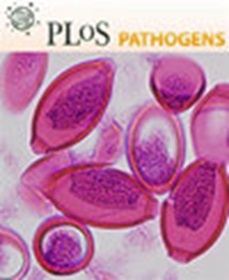微生物胞外囊泡导致抗菌药耐药性。
IF 5.5
1区 医学
Q1 MICROBIOLOGY
引用次数: 0
摘要
随着全球抗菌药耐药性危机的不断升级,迫切需要针对耐药微生物的创新战略。越来越多的证据表明,微生物胞外囊泡(EVs)会导致抗菌药耐药性。因此,全面阐明微生物细胞外囊泡在产生耐药性方面的作用和机制,可为新型抗菌方法提供新的视角和途径。在这篇综述中,我们系统地考察了目前涉及细菌、真菌和寄生虫 EVs 的抗菌药耐药性研究,阐明了微生物 EVs 促进耐药性产生的机制。最后,我们将讨论细菌 EVs 在抗菌疗法中的应用。本文章由计算机程序翻译,如有差异,请以英文原文为准。
Microbial extracellular vesicles contribute to antimicrobial resistance.
With the escalating global antimicrobial resistance crisis, there is an urgent need for innovative strategies against drug-resistant microbes. Accumulating evidence indicates microbial extracellular vesicles (EVs) contribute to antimicrobial resistance. Therefore, comprehensively elucidating the roles and mechanisms of microbial EVs in conferring resistance could provide new perspectives and avenues for novel antimicrobial approaches. In this review, we systematically examine current research on antimicrobial resistance involving bacterial, fungal, and parasitic EVs, delineating the mechanisms whereby microbial EVs promote resistance. Finally, we discuss the application of bacterial EVs in antimicrobial therapy.
求助全文
通过发布文献求助,成功后即可免费获取论文全文。
去求助
来源期刊

PLoS Pathogens
MICROBIOLOGY-PARASITOLOGY
自引率
3.00%
发文量
598
期刊介绍:
Bacteria, fungi, parasites, prions and viruses cause a plethora of diseases that have important medical, agricultural, and economic consequences. Moreover, the study of microbes continues to provide novel insights into such fundamental processes as the molecular basis of cellular and organismal function.
 求助内容:
求助内容: 应助结果提醒方式:
应助结果提醒方式:


